Faculty Publications
St. Jerome's University faculty members participate in a broad range of research projects in a variety of disciplines. The following list represents the books that have been authored or edited by our faculty. These books are available in the St. Jerome’s University Library. For a full list of publications produced by individual faculty members, please refer to the web directory and search by individual names: https://www.sju.ca/directory
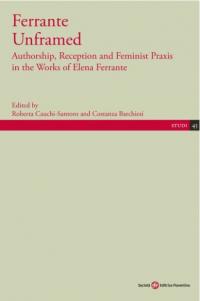 Link to Catalogue
Link to Catalogue
|
Cauchi-Santoro, Roberta, and Costanza Barchiesi, eds. Ferrante Unframed: Authorship, Reception and Feminist Praxis in the Works of Elena Ferrante.Studi. Firenze, Italy: Società editrice fiorentina, 2021. The global visibility of Elena Ferrante in both mainstream and scholarly spheres has firmly established the author as a powerful voice in contemporary World Literature. Despite Ferrante’s international success, however, her novels have not thus far been admitted into the canon of Italian literature. «Ferrante Unframed» argues that Ferrante’s works deserve to be read as essential representations of twentieth-century Italian culture not just because of their literary and meta-literary richness, but even more importantly because of the way they have drawn from and influenced both high-brow and popular culture, appealing to a vast range of readers across nations, social classes, races and sexual orientations. Readers worldwide have identified with Ferrante’s female protagonists, who come of age on the margins of Southern Italian society, in lower-class Neapolitan households, and who resist those mechanisms that attempt to generate female subalternity, instead recuperating female subjectivity and the female body from the clutches of an enduringly patriarchal society. [Source: Publisher's website] |
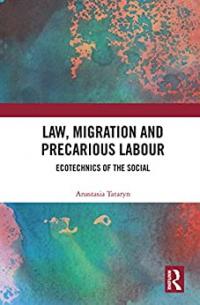 Link to Catalogue
Link to Catalogue
|
Tataryn, Anastasia. Law, Migration and Precarious Labour: Ecotechnics of the Social. London, UK: Routledge, 2021. Providing a radical new approach to labour migration, this book challenges the prevailing legal and political construction of the figure of the irregular migrant labourer, whilst at the same time reimagining this irregularity as the basis of an alternative, post-capitalist, sociality. The text draws on the work of contemporary philosopher Jean-Luc Nancy, and more specifically his term ‘ecotechnics’, in order to examine how economic, political, and juridical norms deny the full legal status of certain people who are deemed to be irregular. This ostensible irregularity is revealed as a regular feature of labour market practice, and a necessary support for the conceptual foundations of capitalist legality. As this book shows, however, this legality – and with it, the technological subordination of life to the circulation of capital as if this were the only possibility for our being in the world – is not insurmountable. The book’s consideration of the figure of the irregular migrant labourer comes to provide an alternative basis for reimagining our relationship not only with migration and with labour itself, but ultimately with each other. This powerful analysis of contemporary labour migration is of considerable interest to legal and political theorists, philosophers, labour lawyers, migration experts, and others with theoretical, political, or policy interests in this area. [Source: publisher's website] |
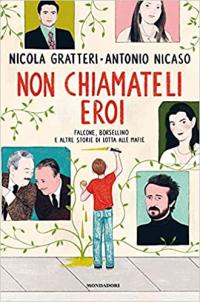 Link to Catalogue
Link to Catalogue
|
Gratteri, Nicola, Antonio Nicaso, and Giulia Tomai. Non chiamateli eroi: Falcone, Borsellino e altre storie di lotta alle mafie. Milano, Italy: Mondadori, 2021. On 23 May 1992 Giovanni Falcone, the escort and his wife were killed in the Capaci massacre. A few months later, on 19 July, Paolo Borsellino and five escort agents lost their lives in the Via D'Amelio massacre. Thirty years after their death, a collection of stories and characters to tell the children about their courage and to continue fighting against the mafias in their name. Nicola Gratteri and Antonio Nicaso recall the lives of those who, looking the Mafia in the eye, decided to defend their ideas, their dignity: the eyes of Giuseppe Letizia who, in the dark, watch in fear of a ferocious murder; the "dangerous" words of Peppino Impastato that ridicule those men considered untouchable; the steadfast principles of Giorgio Ambrosoli; the solitary struggle of the general from the Church; the mission against the mafia of Rosario Livatino, the "boy judge"; Libero Grassi's determination not to give in to extortion attempts; the alternative to the mafia and the possibility of a different life offered to young people by Don Pino Puglisi; the right to live free claimed by Lea Garofalo. Their dreams, their hope, their courage are a way of not forgetting: "Something can be done, and if everyone does it, then a lot can be done". [Source: Amazon.it] |
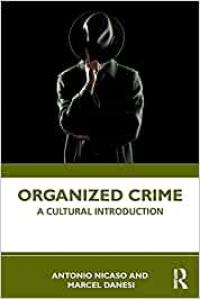 Link to Catalogue
Link to Catalogue
|
Nicaso, Antonio, and Marcel Danesi. Organized Crime: A Cultural Introduction. London, UK: Routledge, 2021. This book aims to describe and demystify what makes criminal gangs so culturally powerful. It examines their codes of conduct, initiation rites, secret communications methods, origin myths, symbols, and the like that imbue the gangsters with the pride and nonchalance that goes hand in hand with their criminal activities. Mobsters are everywhere in the movies, on television, and on websites. Contemporary societies are clearly fascinated by them. Why is this so? What feature and constituents of organized criminal gangs make them so emotionally powerful—to themselves and others? These are the questions that have guided the writing of this textbook, which is intended as an introduction to organized crime from the angle of cultural analysis.[Source: publisher's website] |
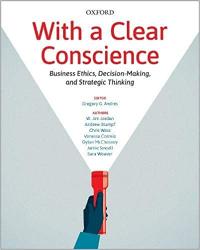 Link to Catalogue
Link to Catalogue
|
Jordan, W. Jim, Andrew Stumpf, Chris Wass, Vaness Correia and Dylon McChesney. With a Clear Conscience: Business Ethics, Decision-Making, and Strategic Thinking. Don Mills, ON: Oxford University Press, 2021. Your current and practical guide to the ethical reasoning process in business. This innovative and engaging new text explores the question: Is it possible to be successful in business while maintaining personal and corporate integrity? With a Clear Conscience prepares students to make ethically informed decisions in the workplace through a balance of theory, contemporary examples, and Canadian and international case studies. [Source: publisher's website] |
 Link to Catalogue
Link to Catalogue
|
McLaughlin, Kenneth, and Murray G. Brooksbank. Preserving Our Past: The Ormston Heritage House: a Window into Waterloo Township's History. Waterloo, ON: Dr. Kenneth McLaughlin, 2020. This historical legacy and the path leading to heritage designation is a fascinating story. From Joseph Brant's (Thayendanegea) concern about the future of his people and Sir Frederick Haldimand's proclamation of the land grant along the Grand Rive, to John Graves Simcoe's worries and Peter Russell's frustrations, we learn about life in another era. The beginning of land sales and the creation of a unique community along the Grand River continues with the arrival of Scottish and English settlers, clearing the land and the challenge of building homes and new lives. The Ormston family's decision to preserve their remarkable heritage home and allow it to tell its own stories is at the heart of this book. [Source: Book cover] |
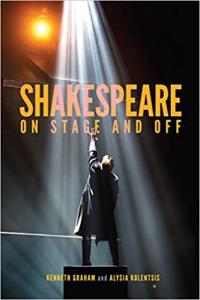 Link to Catalogue
Link to Catalogue
|
Graham, Kenneth, and Alysia Kolentsis, eds. Shakespeare On Stage and Off. Montreal, QC: McGill-Queen's University Press, 2020. Today, debates about the cultural role of the humanities and the arts are roiling. Responding to renewed calls to reassess the prominence of canonical writers, Shakespeare On Stage and Off introduces new perspectives on why and how William Shakespeare still matters. Lively and accessible, the book considers what it means to play, work, and live with Shakespeare in the twenty-first century. Contributors - including Antoni Cimolino, artistic director of the Stratford Festival - engage with contemporary stagings of the plays, from a Trump-like Julius Caesar in New York City to a black Iago in Stratford-upon-Avon and a female Hamlet on the Toronto stage, and explore the effect of performance practices on understandings of identity, death, love, race, gender, class, and culture. Providing an original approach to thinking about Shakespeare, some essays ask how the knowledge and skills associated with working lives can illuminate the playwright's works. Other essays look at ways of interacting with Shakespeare in the digital age, from Shakespearean resonances in Star Trek and Indian films to live broadcasts of theatre performances, social media, and online instructional tools. Together, the essays in this volume speak to how Shakespeare continues to enrich contemporary culture. A timely guide to the ongoing importance of Shakespearean drama, Shakespeare On Stage and Off surveys recent developments in performance, adaptation, popular culture, and education. [Source: publisher's website] |
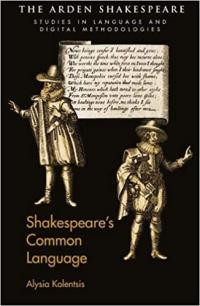 Link to Catalogue
Link to Catalogue
|
Kolentsis, Alysia. Shakespeare's Common Language. London, UK: Bloomsbury, 2020. What can developments in contemporary linguistics and language theory reveal about Shakespeare's language in the plays? Shakespeare's Common Language demonstrates how methods borrowed from language criticism can illuminate the surprising expressive force of Shakespeare's common words. With chapters focused on different approaches based in language theory, the book analyses language change in Coriolanus; discourse analysis in Troilus and Cressida; pragmatics in Richard II; and various aspects of grammar in As You Like It. In mapping the tools of linguistics and language theory onto the study of literature, and employing finely-grained close readings of dialogue, Shakespeare's Common Language frames a methodology that offers a fresh approach to reading dramatic language.[Source: publisher's website] |
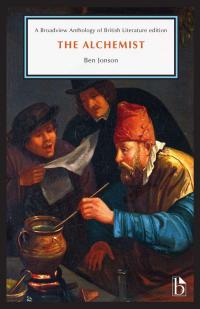 Link to Catalogue
Link to Catalogue
|
Jonson, Ben. The Alchemist. Edited by John Greenwood. Peterborough, ON: Broadview Press, 2020. The Alchemist has long been admired as one of Ben Jonson’s best dramas; its satiric cleverness and metatheatricality have delighted audiences from its first performance to the present day. Audiences are swept up in the schemes of a fake alchemist and other determined fraudsters whose scams appear to offer easy wealth and immortality. While no characters emerge unscathed by Jonson’s satire, and while alchemy itself is revealed as most likely a sham, the play is nonetheless a tribute to the transformative—indeed, the alchemical—powers of the theater. This edition features a helpful introduction to the play, thorough annotations, and contextual materials including a selection of Jonson’s sources, further materials on alchemy, and an example of “rogue” or “coney-catching” literature. [Source: publisher's website] |
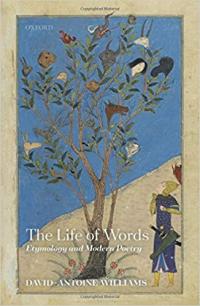 Link to Catalogue
Link to Catalogue
|
Williams, David-Antoine. The Life of Words: Etymology and Modern Poetry. Oxford, UK: Oxford University Press, 2020. For centuries, investigations into the origins of words were entwined with investigations into the origins of humanity and the cosmos. With the development of modern etymological practice in the nineteenth century, however, many cherished etymologies were shown to be impossible, and the very idea of original "true meaning" asserted in the etymology of "etymology" declared a fallacy. Structural linguistics later held that the relationship between sound and meaning in language was "arbitrary", or "unmotivated", a truth that has survived with small modification until today. On the other hand, the relationship between sound and meaning has been a prime motivator of poems, at all times throughout history. The Life of Words studies a selection of poets inhabiting our "Age of the Arbitrary", whose auditory-semantic sensibilities have additionally been motivated by a historical sense of the language, troubled as it may be by claims and counterclaims of "fallacy" or "true meaning". Arguing that etymology activates peculiar kinds of epistemology in the modern poem, the book pays extended attention to poems by G. M. Hopkins, Anne Waldman, Ciaran Carson, and Anne Carson, and to the collected works of Geoffrey Hill, Paul Muldoon, Seamus Heaney, R. F. Langley, and J. H. Prynne. [Source: publisher's website] |